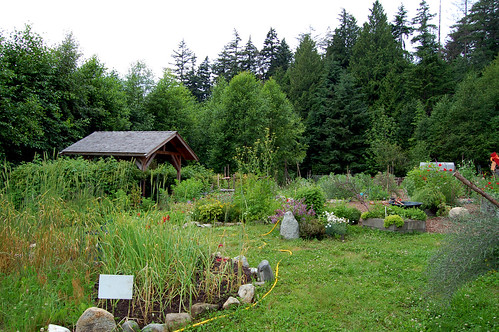.flickr-photo { border: solid 2px #000000; }
.flickr-yourcomment { }
.flickr-frame { text-align: left; padding: 3px; }
.flickr-caption { font-size: 0.8em; margin-top: 0px; }
2008 has been marked by disturbing revelations about the global food market, as we learn that the heavy energy dependence of large-scale commodity farming can have shocking consequences. Is the need for innovative change toward truly sustainable (ie local as possible) agriculture even in question? Here in North America, we’ve also learned that using real estate speculation to drive economic growth can be a dangerous game.
So, this would seem to be a strange moment in human history to plan moving or shrinking the UBC Farm to build “market housing” (AKA condos).
There have been a number of times where cool peers from elsewhere in the world have congratulated me on working for a university progressive enough to have a comprehensive sustainability plan (which we certainly do hear about here as well), and I’m proud to be associated with an institution that at least thinks in terms of food security in its campus plan. But it also seems to me this is a pretty clear case where we learn where the real priorities are, and which principles are just happy talk…
You don’t need to be part of UBC to care about this, or to influence the outcome. To The Quick has details on what you can do to make your voice heard.



pffffft. what has food ever done for me? nothing. give me cheap housing any day. I can eat when I’m dead. You troublemakers with all of your “I want to feed my family” whining. makes me want to drive my Hummer over the mountains to deliver a serious buttwhuppin’. If a public institution decides it’s more important to sell some shacks for a quick buck than to feed people, I think it is our duty to honour, defend, and respect that decision.
Who said anything about “cheap” housing? This is “market” housing:
http://thetyee.ca/Views/2008/04/22/HomeCostCrunch/
Well, surely we will find a solution to this. Perhaps judicious application of Web 2.0 technologies, allowing people to live in remote (and more cost effective) regions and still attend school and work. If you want to live in Vancouver, you’ve got to have the dough. Or, I guess, the money to _buy_ the dough, because that’s going to be even harder to come by than affordable housing…
2% of UBC employees could afford a house on campus. 11% could afford an apartment. That’s just insane. Where do the other 89-98% wind up? schlepping to campus on a 1 hour commute (or more) while the wealthy get to pave the campus farm to build fancy homes. yikes.
You’re right D’Arcy, if Web 2.0 doesn’t save us, surely Web 3.0 will.
The other 89-98% of us are trying to follow your noble example and ride our bikes more!
What do you mean ”what has food ever done for me”? Local farming is just as important for the environment as affordable housing is in our society, and they do not have to fight each other. The municipal government obviously has enough money to develop more if they can pay 100 million to bail out the Olympic village. PUBLIC INSTITUTION = governement = has enough money to develop and MAINTAIN affordable housing elsewhere. Ladner and Sullivan have even removed affordable housing, and then they go and spend 100 million on the Olympic village. Their priorities must be reevaluated and condos (which are not even cheap housing) on a farm will not replace affordable housing.
Hi Vote 16 – you might need to re-calibrate your sarcasm detection meter…
hey, they have had a University farm at UC Santa Cruz for years
http://casfs.ucsc.edu/
I bet they have some tips for keeping the farm!